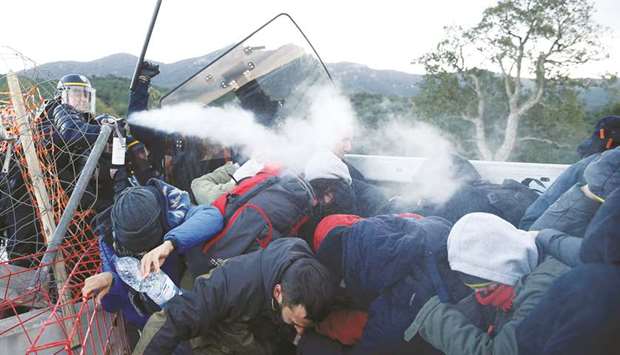French, Spanish and Catalan police intervened yesterday to clear a motorway border crossing to Spain that had been blocked for more than 24 hours by Catalan pro-independence activists.
The Democratic Tsunami civic group occupied the AP-7 motorway on Monday at the start of a three-day series of protests called to follow Sunday’s Spanish general elections.
Hundreds of protesters were cleared from both sides of the French and Spanish borders, but they proceeded to temporarily block the N-II state highway, which runs parallel to the AP-7 motorway.
There were moments of tension as a truck driver tried to force the blockade on the N-II.
The Catalan police, the Mossos d’Esquadra, said they arrested a man for trying to run over people.
French authorities wrote on Facebook that the A9 – the motorway’s number on the French side – had been reopened to traffic in both directions as of shortly after 5pm (1600 GMT).
According to media reports, French police used tear gas against protesters.
The El Pais newspaper said 18 of them were arrested by French police and one by the Mossos d’Esquadra.
Democratic Tsunami announced another protest for later: the blockage of the Franco-Spanish border in Behobia, in the Basque Country.
On Twitter, protesters claimed that both Catalonia and the Basque Country, another region with a separatist movement, “are living an unsolved political conflict with the Spanish state”.
The Democratic Tsunami protests started after the Spanish Supreme Court last month sentenced to jail nine Catalan secessionist leaders for organising an illegal independence referendum in 2017.
The group, which has no visible leaders, uses a mobile phone app to co-ordinate its actions.
Prior to Monday, one of its most high-profile protests was the occupation of Barcelona’s airport.
In another flashpoint of the Catalan crisis, the region’s parliament approved a motion affirming the right “to concretely exercise the right to self-determination and to respect the will of the Catalan people”.
The Catalan motion was immediately invalidated by the Spanish Constitutional Court, which accepted an appeal presented by the central government.
The northeastern region of Catalonia, including its capital Barcelona, is one of the wealthiest and most dynamic parts of Spain, accounting for almost one-fifth of the Spanish economy.
Secessionist feelings in the region are boosted by a separate language and culture, but Catalans are deeply split on independence from Spain, with an apparent slight majority against it.
The Catalan crisis is likely to be a pressing priority for the federal government that may be formed after the socialist PSOE party announced yesterday a coalition deal with the leftist Unidas Podemos (see lead story, above).
Acting Prime Minister Pedro Sanchez’ PSOE won the most votes on Sunday, but beyond the pact with Unidas Podemos, it needs the support or abstention of other parties to clear a parliamentary majority.

Members of Catalan protest group Democratic Tsunami clash with French police officers at the AP-7 highway on the French side of the Spanish-French border.
